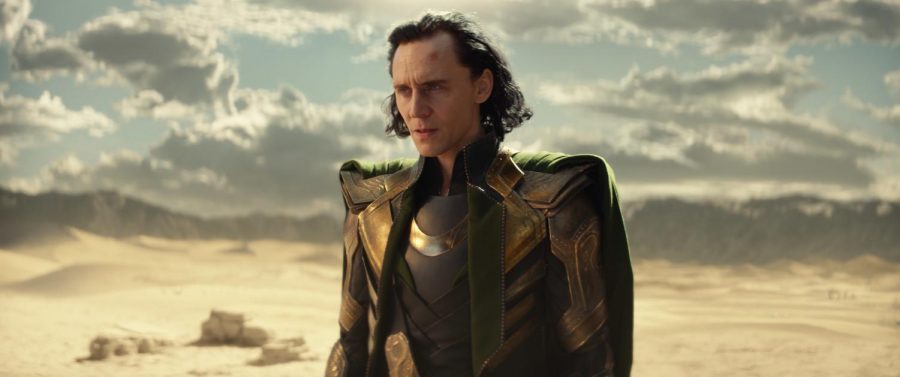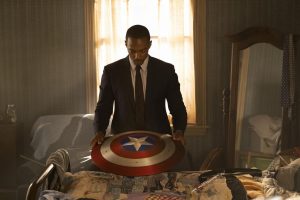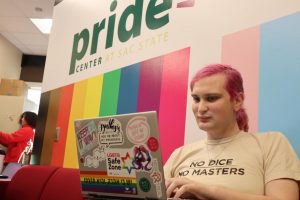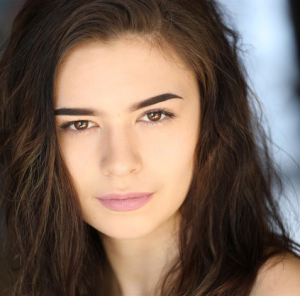OPINION: It’s time for the Marvel universe to follow through on LGBTQ+ representation
Phase four promises diversity, but will it deliver?
Loki (Tom Hiddleston) in Marvel Studios’ “Loki,” exclusively on Disney+. Loki is the first character to be gender fluid in the MCU, meaning their gender identity falls outside the binary construct. Photo courtesy of Marvel Studios. ©Marvel Studios 2021. All rights reserved.
June 28, 2021
Disclaimer: Large spoilers for Wednesday’s installment of “Loki,” titled “Lamentis,” “Falcon and the Winter Soldier” and “WandaVision” ahead. Potential spoilers for “Eternals,” “Thor: Love and Thunder” and “Doctor Strange in the Multiverse of Madness.”
Marvel has been promising more LGBTQ+ representation for the past two years, and it can’t seem to deliver.
I will reluctantly admit that the studio seems well-intentioned with projects they have on the horizon, but based on a history of hyping up miniscule milestones, I am skeptical to see what they do next.
The biggest step forward for Marvel in their recent projects was in Wednesday night’s episode of “Loki.” Though fans like myself have speculated for months on our Instagram explore pages, last night was the first time we had confirmation of the well-known, fan-favorite Marvel character’s bisexuality.
Earlier this month, Loki was also confirmed to be gender fluid.
The news was revealed in the early morning of June 7 during a promo via Twitter for the show’s premiere. Viewers can only see the good news for a split second at the very beginning of the teaser, but it’s there nonetheless. This marks the first character in the Marvel Cinematic Universe whose gender identity falls outside the binary construct.
On the contrary, the studio’s long list of empty promises began in late 2019 when a student at the New York Film Academy waited their turn in a long line to ask guest speaker Kevin Feige, President of Marvel Studios, if there were any plans to bring more LGBTQ+ characters into the MCU—“specifically the ‘T,’ trans characters.”
Feige responded affirmatively and referenced an unnamed character in a movie they were shooting at the time.
Due to COVID-19 restrictions, this movie has yet to come out, and fans were robbed of what would have been only the second member of the LGBTQ+ community on Marvel screens.
The first was played by co-director Joe Russo in “Avengers: Endgame.” After hyping up the inclusion of the first gay character in a Marvel movie, the Russo brothers delivered an underwhelming 40-second performance about a man who lost his significant other after Thanos’ snap and was trying to find love again.
As far as LGBTQ+ representation goes, the Marvel universe seems to only satisfy the “G” criteria—twice.
This is not nearly enough.
In early 2020, Variety published an article that said two sources close to Marvel Studios came forward to clarify that Feige did not, in fact, reference a transgender character in his guest speaker series but the same openly gay one in the upcoming “Eternals” film that he mentioned at the D32 Expo in August 2019.
It is 2021. We have a Black Captain America, an Asian-American, woman vice president with her pronouns in her Twitter bio and the option to add your own pronouns to your My Sac State Student Center.
It should not be too much to ask of Marvel Studios to at least fill out the rest of the LGBTQ acronym (if we set aside the “+” for a moment), but clearly it is if it has taken them this long to get past the straight, cisgender forced romances we have been fed for the last 13 years. They possess the power to popularize pronouns as much as they did a giant purple alien snapping his fingers with a golden glove.
I used to work as a summer camp counselor; the amount of “Wakanda: Forever”s” that I heard children say on the playground made my chest swell with pride as a fan. It made me realize the span of Marvel’s influence.
Their current representation is a pathetic excuse for diversity. They assure us in the coming months to give more, but with one character in 23 films, their promise sounds empty.
“Spider-Man: Far From Home” broke barriers when they cast Zach Barack, Marvel’s first transgender actor, to play Peter Parker’s classmate. However, much like the “Endgame” cameo, inclusion isn’t very progressive if you take these milestones and downplay them to roles with little to no lines.
Furthermore, fans got excited when in the third episode of “WandaVision,” Wanda birthed her famous twins from the comics. It is interesting to point out that the adult version of Billy in the source material later becomes the gay superhero, Wiccan, who maintains a steady relationship with the Skrull, Hulkling.
For a time, it was rumored that up-and-coming actor Isaiah Knott would be helming this role after he deleted a post of himself on set wearing a collared shirt under a sweater in front of a white fence. But, this scene was never in the show, and as we know from director Matt Shakman, plenty of material was cut due to COVID-19.
Perhaps it was another example of a wonderful opportunity that Marvel ultimately didn’t take. Marvel has a plethora of these.
The marvelous thing about franchises is that you can make standalone films take place within the same universe but have very different tones. Take 20th Century Fox’s “Logan” for example or Warner Bros.’ “Joker.”
We watched Scarlet Witch and Bucky sob their way through their respective TV shows. How hard would it be for Marvel to fund a spin-off that focuses on a superhero finding their own sexual or gender identity, like a “Call Me By Your Name” or “The Danish Girl.” I’m not going to pitch a film, but the story doesn’t even have to focus on a superhero. It could dive into the likes of a fan-favorite supporting character.
In theory, the potential film could save the studio hundreds of millions of dollars in terms of a budget and garner much public attention at awards ceremonies. It would have the Marvel logo slapped on it, so it would likely make a profit.
It sounds like a risk the studio could afford to take and perhaps they should since their action-packed films seldom have time for love stories that aren’t cisgender.
Feige’s biggest insult to the LGBTQ+ community was lazily admitting that Tessa Thompson’s Valkyrie from “Thor: Ragnarok” and “Endgame” fame was bisexual after the character’s appearance in two different films. Though, it did mark the first time the letter, “B,” of the LGBTQacronym was included.
According to Collider, it was Thompson herself who had to take to Twitter to tell the good news to her fans after a scene explaining her sexuality was cut from her debut in “Ragnarok.” CNN also reported that the Marvel Universe is finally ready to explore this aspect of the character a year from now in “Thor: Love and Thunder.”
The studio gave us hope with the announcement of America Chavez’s appearance in “Doctor Strange in the Multiverse of Madness.” The dimension-traveling, Lesbian and Latina powerhouse will be played by Xochitl Gomez, though unlike Valkyrie it is unclear whether or not she will have a romantic storyline. Considering the “WandaVision” end-credit scene and the film’s ties to the third Spider-Man installment, it is very possible they will not explore this aspect of the character.
“Doctor Strange in the Multiverse of Madness” comes out on March 25, 2022. If they do take Chavez’s storyline in an LGBTQ+ direction, then three of the five letters in the acronym will be included by the end of next year.
I yearn for the day Feige can include the “T.”
Until then, we will have to live with this November’s release of “Eternals.”
The homosexual member of the immortal team is Brian Tyree Henry’s Phastos. He is the technologically-oriented inventor of the group who will not only share a scene with his family but a “beautiful, very moving” kiss with his husband, played by actor Haaz Sleiman.
Hopefully, it won’t be as tactless as Russo’s “Endgame” cameo or Disney’s other franchise-baby, Star Wars.
Eight months after “Endgame,” maybe even after seeing that film, director J.J. Abrams threw in a two-second Lesbian kiss in the finale of “Star Wars: Episode IX – The Rise of Skywalker” during the film’s falling action.
Progress does have to start somewhere. While these so-called milestones are unsatisfying, it is inherently good that they are happening. I am an immense Marvel fan, and because of that I feel it is my duty to hold them to a higher standard. Feige seems well-intentioned, but I don’t know if that’s enough.
As Captain America said best in “The Falcon and the Winter Soldier” finale: “Do better.”
Now more than ever, I implore them to remember that with great power comes great responsibility.







































































































































